
Increase your productivity by using the best desktop publishing software.
These software allow you to put out pro-grade business documents that will catch the attention of your audience and drive more sales. It can be used for designing brochures, flyers, posters, newsletters, and webpages with maximum convenience. Such solutions provide a broad selection of formatting options, making it easy to design professional, visually appealing content that matches your needs perfectly.
To ensure your next print project goes through without a hitch, I’ve reviewed the best publisher software (DTP) you can get today, covering options for both experienced designers and newbie editors. During the testing process, I’ve evaluated how intuitive each solution is, its availability across different platforms, functionality, performance, and pricing.
★★★★★ (5/5) Market leader
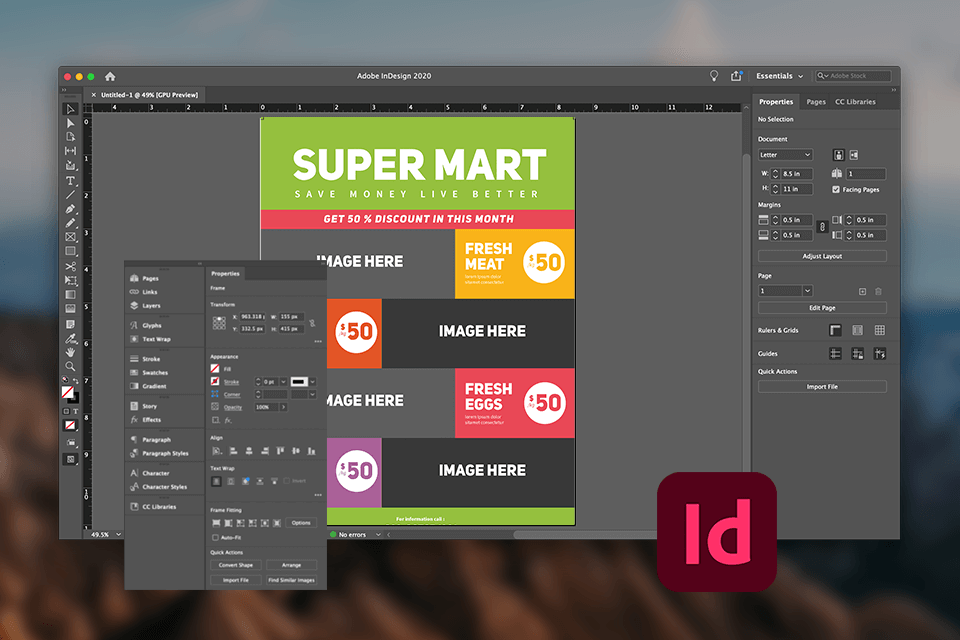
Platforms: Windows, macOS
Price: 7-day free trial or from $34.49/month
Verdict: Adobe InDesign is arguably the best desktop publishing software for graphic designers, illustrators, and publishers who want to control the tiniest details of their layouts. This tool is also frequently employed by marketing and branding companies for designing corporate materials. InDesign offers such convenient features as automated pagination, chapter naming, and tables of contents, among many others.
I was happy to see how user-friendly this software is. It’s a fantastic option for beginners who don’t have any publishing experience. InDesign also comes with a broad range of tutorials, manuals, and troubleshooting solutions that will help you learn the ins and outs of the software.
It’s worth mentioning that InDesign for Windows or Mac can cost quite a lot, particularly for users and startups on a limited budget, but its expansive functionality mostly makes up for that fact. You can leverage the available tools to create high-quality posters, flyers, pamphlets, brochures, banners, magazine covers, books, and presentations.
★★★★☆ (4.5/5) For Windows PCs
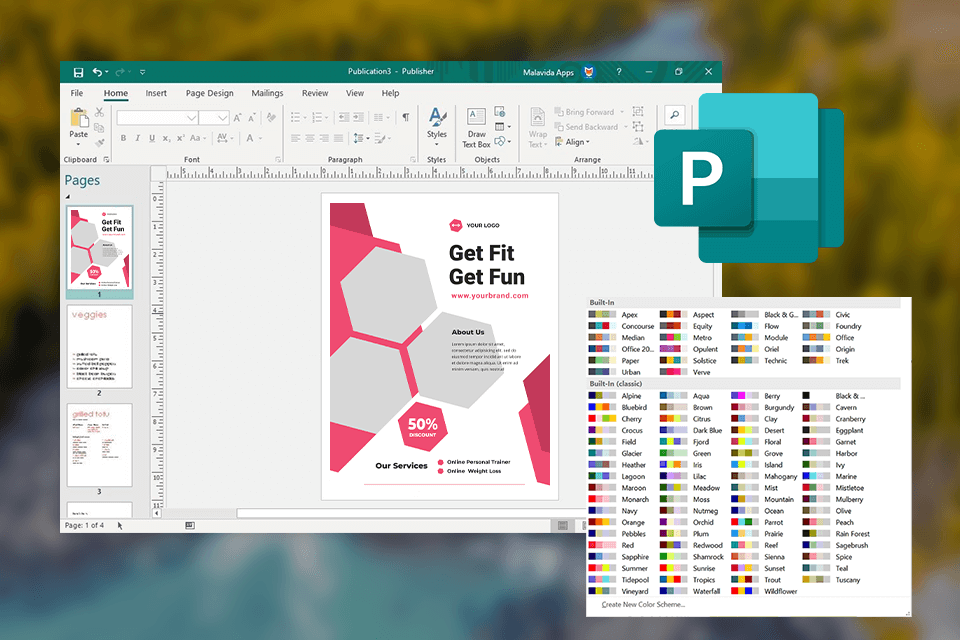
Platforms: Windows
Price: Free or from $6.99/month
Verdict: At a basic level, Microsoft Publisher offers everything you need to create some relatively complex layouts. You get all the features that DTP programs have, from guides to text flow between boxes. Its interface is very intuitive and easy to use.
I like that you can select styles, margins, fonts, columns, and almost anything else from a dropdown menu. Dialog boxes are also available if needed. This allows users to quickly edit a page layout.
You can create very impressive page layouts, from 1-page posters to 50-page brochures, and you don’t need to be a DTP expert to do it. After pitting InDesign vs Publisher, I have also noticed that the latter is slightly inferior when it comes to templates and customization options.
★★★★☆ (4.5/5) Useful time-saving functionality
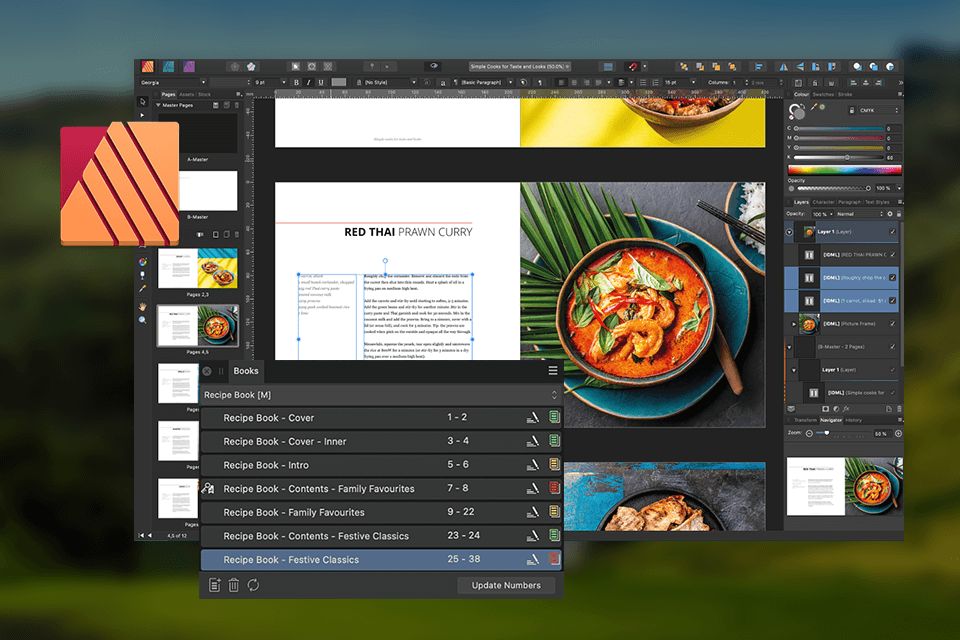
Platforms: Windows, macOS
Price: 30-day free trial or from $69.99
Verdict: Affinity Publisher might be the best software for desktop publishing that is aimed at both amateur and experienced users. This tool provides a diverse set of typography features, enabling you to design stunning, professional-quality publications.
I particularly appreciate the fact that this software doesn’t require you to subscribe. In contrast to InDesign which asks for monthly or yearly payments, Affinity Publisher is available for a single-time purchase.
I also like the expansive layout and design toolsets included in this software. You can take advantage of double-page spreads, customizable tables, scalable vector picture frames, and layer effects. Lastly, Affinity Publisher comes with a preflight checking feature that allows you to localize and deal with any issues in your project.
★★★★☆ (4/5) Open-source
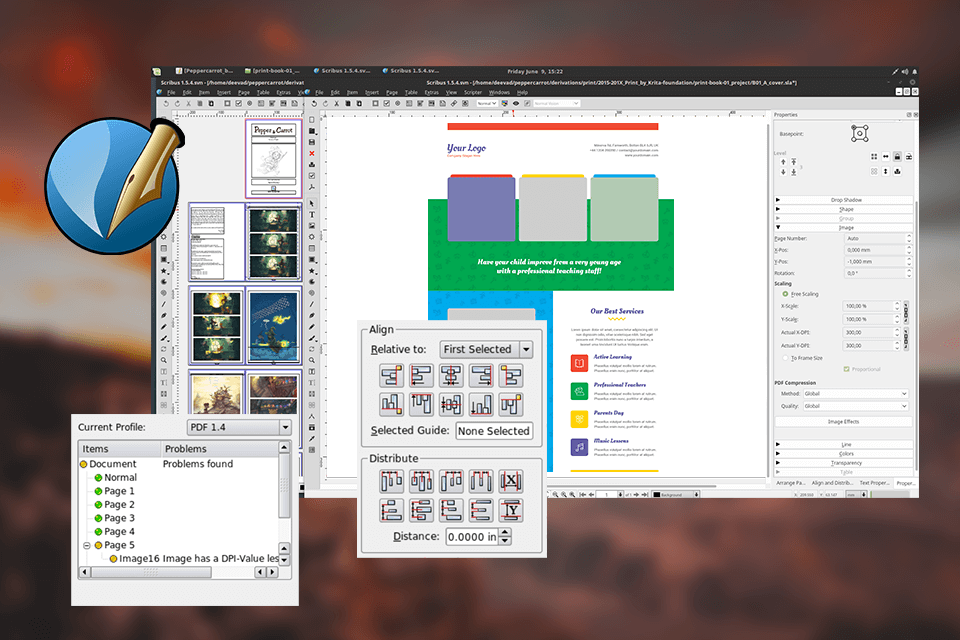
Platforms: Windows, macOS, Linux
Price: Free
Verdict: Scribus`s frame and layer system is similar to InDesign and Affinity Publisher. It offers such advanced features as CMYK color support and allows you to create commercial-quality PDF files. However, it doesn’t provide many fonts or support Pantone colors.
Scribus offers features usually found in book publishing software, as you can use it to create beautiful pages for your story or magazine article. It can also be useful for designing interactive forms and PDFs which you can share online or with other users.
I greatly enjoyed using Scribus thanks to its pro-grade tools, unrivaled layout customization, impressive PDF processing, multiplatform availability, and helpful community.
★★★★☆ (4/5) Pro-grade features
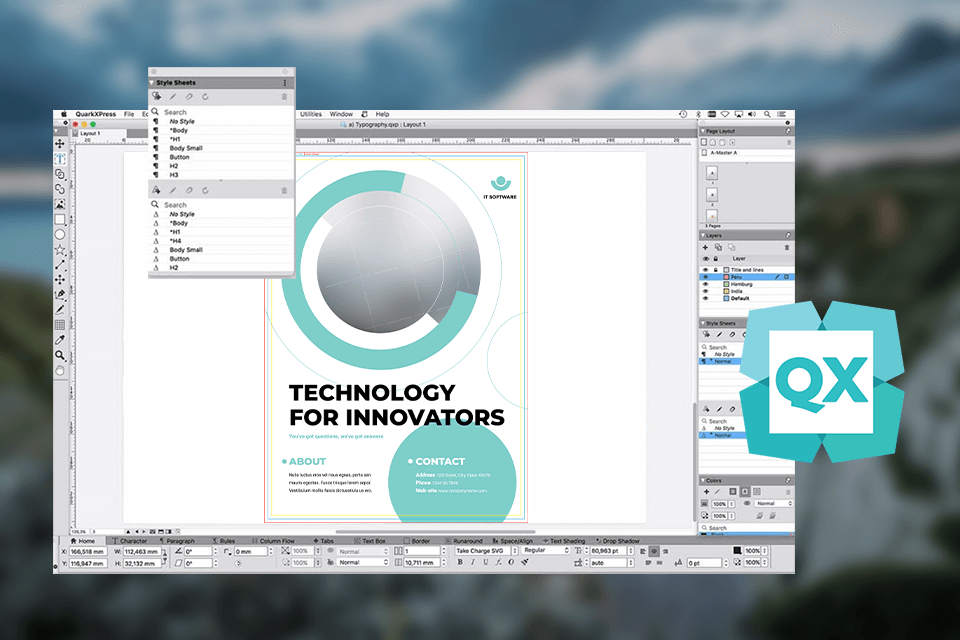
Platforms: Windows, macOS
Price: Free trial or from $259/year
Verdict: This is a great alternative to Adobe InDesign and one of the best desktop publishing software. It provides plenty of features that InDesign also has and even supports its files. In terms of quality, QuarkXPress offers more advanced functionality.
The main advantage of this software is that it boasts OpenType controls, supports Colour Fonts in SVG, SBIX, and COLR formats, and helps users create stunning publications.
However, the aspect I appreciated the most are the automation features. They streamline repetitive actions and have saved a ton of time for me in the process. Additionally, such tools as conditional styles, master pages, and layout variables can help you devise effective design workflows, which are essential for multipage or multi-version projects.
★★★★☆ (4/5) Browser-based
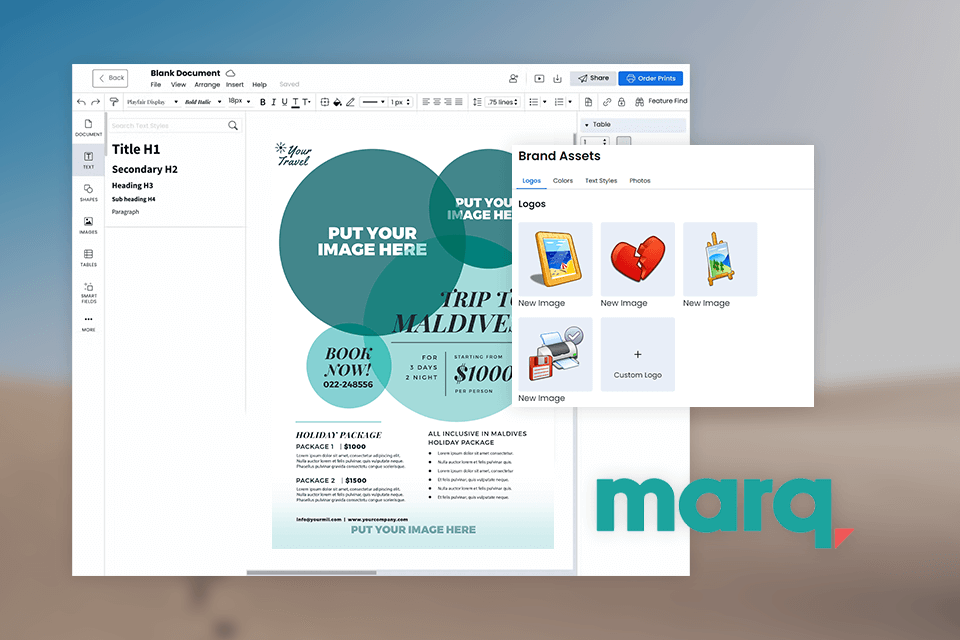
Platforms: Web
Price: Free or from $10/user
Verdict: Marq (initially marketed as Lucidpress) is a web-based solution for designing brochures, flyers, and newsletters with minimum hassle. If you pit Adobe InDesign vs Lucidpress, you’ll realize that the latter is more beginner-friendly and can be used even if you don’t have any relevant experience.
It allows you to pick from different premade templates and personalize them according to your project needs. I also appreciate how useful it is for collaborating with fellow designers. You and your teammates can edit the project at the same time without overwriting the edits made by other users.
Another reason why Marq can be considered the best publishing software is its integration with Google Drive, Evernote, and Dropbox, which you can use to synchronize all your creations. Additionally, it comes with a PDF viewer and editor that enables you to open and edit PDF documents without having to use other tools.
★★★★☆ (4/5) AI-powered
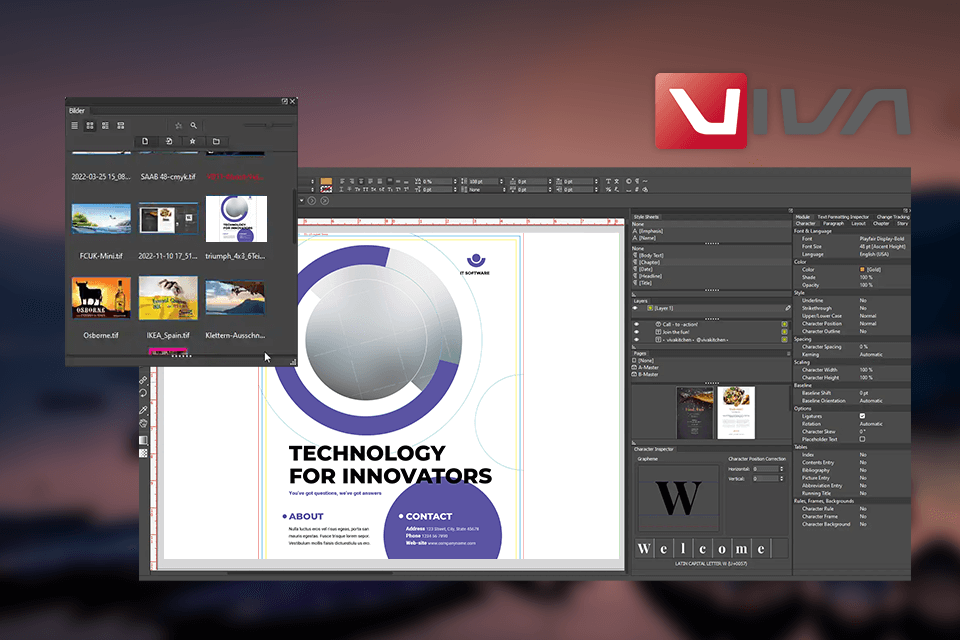
Platforms: Web, Windows, macOS, Linux
Price: Free or from $139
Verdict: VivaDesigner provides a broad range of design and layout features that simplify the task of making brochures, posters, and flyers. You can use it to handle rare text formats more efficiently compared to alternative DTP software due to the inclusion of ligatures and tracking. As such, you can better control the look of your text and ensure the result meets all your requirements.
Another positive aspect of this book design software is its capability to automatically change the size of your document. It’s particularly useful for printing houses since this feature minimizes printing expenses and guarantees the same level of quality is preserved during the entire print process.
Lastly, the versatile layout adaptation functionality ensures you don’t have to make any manual changes, significantly streamlining your workflow.
★★★★☆ (4/5) For beginners
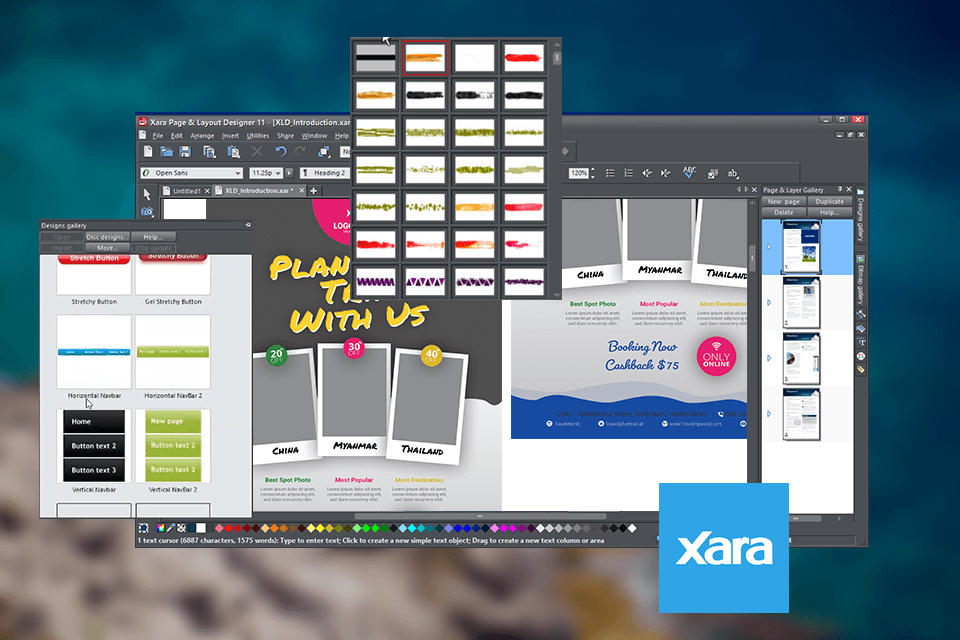
Platforms: Windows
Price: 7-day free trial or from $9.99/month
Verdict: Xara Page & Layout Designer is the best desktop publishing software for beginners due to its intuitive UI. Thanks to the expansive library of adjustable templates, adding various elements and designing professional, good-looking documents is both fast and easy.
In addition to providing standard text and layout tools, this solution can also be used for enhancing images and illustrations, as it comes with features typically only found in the best photo editing software for PC. As such, you can employ Xara Page & Layout Designer to make anything from business cards to stylish flyers.
That said, it’s worth mentioning that this software might be a poor choice for users involved in complex projects, as it doesn't have some of the tools included in the more advanced DTP solutions reviewed above.
| Adobe InDesign | Microsoft Publisher | Affinity Publisher | |
|---|---|---|---|
|
Interface |
User-friendly |
Convenient controls |
Professional level |
|
Price |
7-day free trial or from $34.49/month |
Free or from $6.99/month |
30-day free trial or from $69.99 |
|
Notable Features |
|
|
|
|
Best for |
Diverse range of print materials |
Designing standard publications like flyers, brochures, newsletters |
Books, magazines, site mockups, and other marketing materials |
Such software is designed for creating documents that contain text, pictures, and graphics. It’s an advanced solution that can be employed for designing brochures, posters, magazines, and books. You can also pair it with flyers software to expand the range of available design features.
Give preference to options that support easy image and text formatting, allow creating multiple pages for the same project, and come with color management features that help achieve realistic colors. Text-flow management and typography tools are also essential if you want to create beautiful documents that meet all formatting standards.
Yes, the market offers multiple wallet-friendly options. Some software can be tested free of charge while other tools offer a free version with a limited feature set. For instance, Scribus is an open-source DTP solution that provides a user-friendly UI and convenient text formatting tools. Desktop publishing software reviews often mention it as a terrific option for users interested in a more straightforward program.